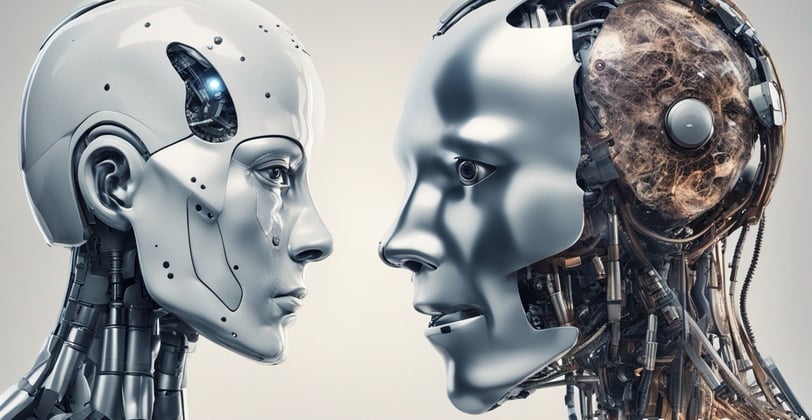AI vs Human: When to Automate (And When Not To)
Artificial Intelligence (AI) is transforming industries, but does that mean humans are becoming obsolete? Not at all! While AI excels in speed and data processing, humans bring creativity, emotional intelligence, and critical thinking to the table. The key to success? Knowing when to automate and when to keep tasks human-driven.
Harsh Gupta
5/2/20252 min read


1. Tasks Where AI Outperforms Humans
AI is unbeatable in structured, repetitive, and data-heavy tasks. Here’s where automation works best:
✅ Data Processing & Analysis
AI can analyze massive datasets in seconds.
Example: Financial forecasting, customer behavior trends.
✅ Customer Support (Chatbots & FAQs)
AI chatbots handle routine queries 24/7.
Example: Answering order status questions on e-commerce sites.
✅ Content Recommendations
AI personalizes suggestions based on user behavior.
Example: Netflix recommendations, Spotify playlists.
✅ Automated Scheduling & Reminders
AI tools like Calendly manage appointments effortlessly.
Example: Booking meetings without back-and-forth emails.
✅ Spam & Fraud Detection
AI detects suspicious activity faster than humans.
Example: Gmail’s spam filter, banking fraud alerts.
✅ Manufacturing & Quality Control
AI-powered robots assemble products with precision.
Example: Tesla’s automated car production line.
2. Where Humans Still Dominate
Despite AI’s advancements, some tasks require human intuition, empathy, and creativity.
🧠 Creative Work
AI can generate content, but humans add originality and emotion.
Example: Writing novels, designing brand logos, composing music.
💡 Strategic Decision-Making
AI provides data, but humans interpret it for business strategies.
Example: CEOs making long-term company decisions.
❤️ Emotional Intelligence & Empathy
AI can’t truly understand human emotions.
Example: Therapists, nurses, and customer service reps.
🤝 Negotiation & Persuasion
Humans read body language, tone, and subtle cues.
Example: Sales professionals closing high-value deals.
🔍 Ethical & Moral Judgments
AI lacks a sense of right and wrong.
Example: Judges in courtrooms, HR handling workplace disputes.
3. The Best Approach? A Hybrid Model
Many industries now combine AI efficiency with human expertise for the best results.
📌 Healthcare
AI: Analyzes X-rays and lab reports.
Humans: Doctors make final diagnoses and interact with patients.
📌 Content Creation
AI: Generates blog outlines or social media captions.
Humans: Writers add personality, humor, and brand voice.
📌 E-Commerce
AI: Recommends products based on browsing history.
Humans: Marketers craft compelling ad copies and promotions.
📌 Finance
AI: Detects fraudulent transactions.
Humans: Agents handle complex customer disputes.
📌 Education
AI: Provides personalized learning paths.
Humans: Teachers motivate and mentor students.
4. Should You Automate? A Quick Checklist
To decide whether a task should be automated, ask:
🔹 Is it repetitive and rule-based? → AI wins
🔹 Does it require creativity or empathy? → Humans win
🔹 Can AI handle 80% of the work, leaving humans to refine? → Hybrid approach
Final Thoughts
AI is a powerful tool, not a full replacement for humans. The future belongs to those who leverage AI for efficiency while keeping human skills at the core.
What’s your take?
Do you prefer AI automation for certain tasks?
Where do you think humans will always outperform machines?
Let’s discuss in the comments! 🚀
Insights
Explore AI tools for small business automation today.
Connect
Support
© 2025. All rights reserved.
